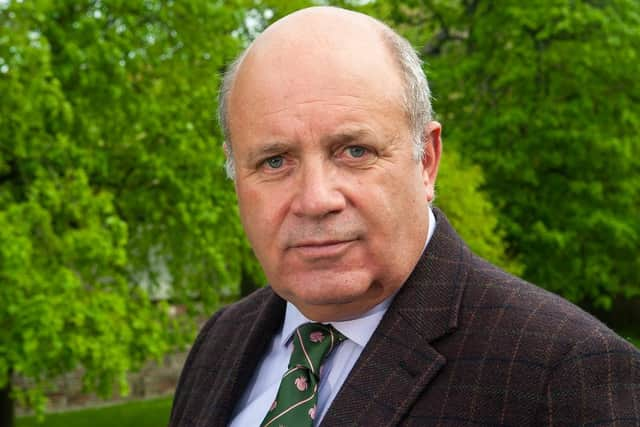CMS Sustainable Tourism: Managing director Allan Wernham and STA's Marc Crothall on the sector's key issues


This is the final article in international law firm CMS' Sustainable Tourism campaign, which began in March and has seen experts discuss topics including net zero, employment, festivals, and food and drink.
What are the key opportunities and challenges for Scotland's tourism sector going into 2024?
Advertisement
Hide AdAdvertisement
Hide AdWe are a hugely popular destination known for our heritage and culture, which are massively appealing to international audiences, particularly the US market.


We are now seeing a bounce back in business tourism. The SEC and EICC are reporting what looks like one of the strongest years they have ever had in the convention business.
A new trend that is emerging is blended travel. More people are extending their stay, renting a cottage or living in another city while blending work and leisure at the same time.
There is opportunity to encourage visitors to stay longer, which aligns with responsible travel and being considerate of the planet.
However, the cost of living crisis has really taken its toll on discretionary spend, particularly by families, who are likely to take fewer, shorter trips.


We commissioned 56 Degree Insight to survey 1,000 Scots on their holiday intentions. The survey found that they have definitely been spending a lot less than in 2022.
There is a diluted workforce in the Scottish tourism sector at the moment, down by around 35,000 from 2019. With some 175,900 people in the industry, as opposed to 209,000, there are a lot of gaps to fill.
Staying competitive is the overarching challenge.
For example, the war in Ukraine has seen Turkey lose 6 million Russian tourists and 4 million Ukrainians who would traditionally holiday there.
Advertisement
Hide AdAdvertisement
Hide AdSo, as a destination, Turkey is trying to compete for new markets – and that is an example of what we are up against.
How important are a business’s ESG credentials when attracting and retaining staff?
Our national tourism strategy, Scotland Outlook: 2030, is underpinned by the strap line 'responsible tourism for a sustainable future'.
All age groups now want to be responsible in every way and are much more considerate about their impacts.
Businesses demonstrating their ESG credentials in practice, like the really great global hospitality operator Sodexo, do attract and retain staff.
There are responsibility considerations for the adventure sector. Tour operator Wilderness Scotland has been really inclusive by bringing their workforce into discussions and allowing the younger generation to be the voice of the business.
Good ESG is not just about creating behavioural change in a business, but fair work principles are key.
How well placed is Scotland to offer clean travel infrastructure between and around destinations?
Advertisement
Hide AdAdvertisement
Hide AdIt is one of the key priorities identified in Scotland Outlook: 2030 to enable us to achieve our aspiration of being a world leader in 21st century tourism.
There are implications for the night-time economy in moving both staff and visitors, as we have seen recently with the introduction of the low emission zone in Glasgow.
Market researcher Euromonitor surveyed 40,000 people worldwide and found the eco-adventurer is certainly a classification of traveller, as are the cultural explorer and wellness worshipper.
Scotland, with its great outdoors and assets, has fantastic offerings in those regards, but completing the North Coast 500 with an electric car is a challenge right now.
International in-bound tourism is hugely important and while air travel is not good for the planet, there is a lot of work being done to create more reasons for people to stay in destinations longer and so reduce the number of trips taken.
What are your thoughts on the introduction of a transient visitor levy?
The STA has for many years been against it because of our concerns around price.
Our country is already the highest taxed in Europe with 20 per cent VAT and air passenger duty.
Advertisement
Hide AdAdvertisement
Hide AdA transient visitor levy has to be used as a force for good and be an incremental investment into the visitor experience.
We have concerns about the proposal in Edinburgh regarding the scale of levy and the percentage model.
In Manchester, for example, the levy is £1 per night per anyone who is a visitor – but in Edinburgh it will be based on a percentage, apply to everyone including residents and include VAT.
All stakeholders will have to work together collaboratively to work out how best money raised is spent.
How can festival organisers work better with communities?
Edinburgh’s 2030 Tourism Strategy is being developed and very much has communities at its heart.
Communities are already part of our industry; tourism is everybody's business.
The short-term lets let licensing scheme did not land very well across the country and has led to challenges.
Successful tourism requires communication and strong destination management organisations, but the scheme has unnecessarily caused upset in terms of the relationships between local communities and short-term let operators.
Advertisement
Hide AdAdvertisement
Hide AdIn the islands, Orkney is expecting 256 port calls, by cruise liners each decanting up to 3,500 passengers, next year which is quite an impact on a community.
But Orkney does it really well.
Good tourism involves expressing the benefits to communities, being sympathetic to the environment and navigating the movement of people well.
How is travel tech benefiting the sector?
The digital traveller is an important trend. A big opportunity is combating challenges posed by a smaller workforce and being cleverer with technology in businesses.
We are less time rich now, but when you use technology to curate an itinerary and do everything in advance through a platform, your real-time experience is much greater.
Tech adoption is still seen to be expensive when it isn't – so we need to change those beliefs.
Tourism is a hospitality and people-led industry and conversations are essential, but tech can be used really well to tell stories.
The Geotourist personal tour guide app is a great example of a business doing this.
Technology will not replace people; the industry should engage it to improve productivity and make the bottom line stronger.
What is happening in experiential tourism?
Advertisement
Hide AdAdvertisement
Hide AdScotland has a real opportunity to do a lot with agritourism and the diversification of farms delivering a variety of different experiences.
Going into the world of a farm to experience escapism, which touches upon wellness, is real and food and drink are naturally found there.
Just a stone's throw from Edinburgh city centre is a £55m investment into the Lost Shore Surf Resort.
Who would have thought there would be an inland surfing resort in Ratho that will generate 1,000 waves an hour and have the ability to host up to 90 surfers at a time?
And wrapped around the surfing experience are wellness, high-end cabins and much more.
The resort is a brave investment but it is visionary.
We have the opportunity to do experiential tourism well, but it requires a blend of tech, people and community.
To find out how CMS can support and advise your business, go online and visit cms.law/scotland
About our Partner CMS Scotland
Committed to supporting businesses in an ever-changing landscape As legal advisers and business partners, we are continually adapting how we do business to help our clients find new ways to succeed at a time when the Scottish economy is facing significant challenges. We focus on ways to mitigate risk and harness innovation to ensure your organisation can make the most of opportunities. Aberdeen, Edinburgh and Glasgow based lawyers are firmly embedded in their local markets and have the resources and infrastructure of a global organisation behind them. With over 500 people here, we are serious about Scotland. We have an exceptionally strong focus on businesses in Scotland that include start-ups, government bodies, manufacturers and investors. We also work with some of the largest organisations operating around the globe. Clients often tell us that our genuine ability to assemble the right teams, wherever they are located, sets us apart from other firms. The expertise of over 5000+ lawyers in over 40 countries cities can be mobilised quickly to create the best team for every situation.
Visit CMS Scotland's website from here.Follow on social media:
